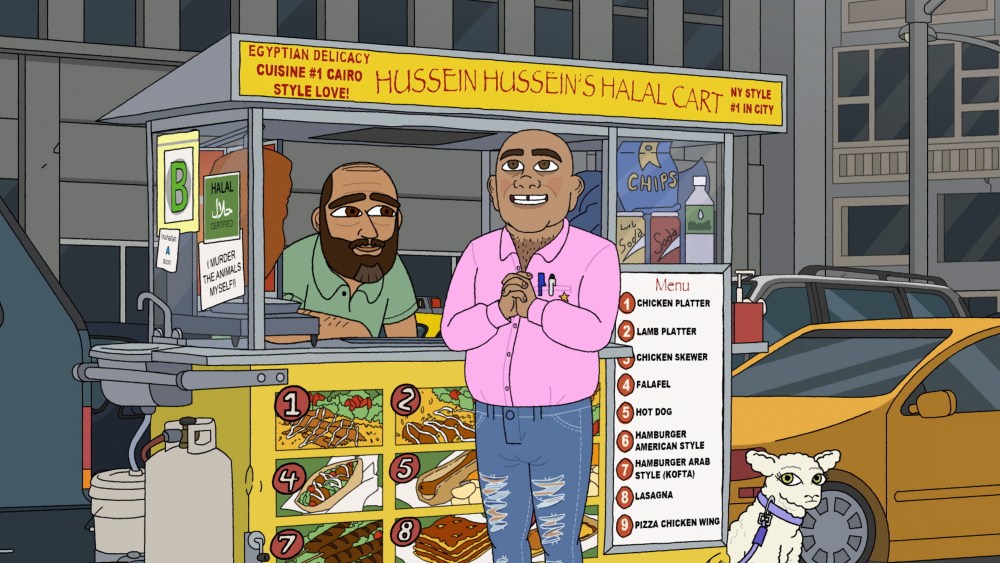When Ramy Youssef was conceptualizing the music for Prime Video’s “#1 Happy Family USA,” he started by looking at a lot of Egyptian and Lebanese music to license for the show’s opening track.
The adult animated sitcom co-created by Youssef with Pam Brady (“South Park”) follows a Muslim family in New Jersey during Sept. 11, 2001. Youssef voices the family’s teen son, Rumi, and his father, Hussein, a halal food cart owner.
As Youssef was traveling around the country, he was sending in voiceover work for the show. And somewhere along the way, he picked up a guitar and started riffing as Hussein. Youssef says, “The whole idea of Hussein singing music came about very organically.”
One of the first riffs Youssef did was “Money for the Meat,” a ballad-esque song in which Youssef laments about his halal cart, pleading for people to eat there.
Youssef felt inspired by the character whom he describes as “so anxious and intense. There’s something about doing music with her where all of a sudden you feel there’s a vulnerable undercurrent to him, and we wanted to bake that into the show.” However, Youssef reveals, “I hadn’t picked up the guitar since high school in any meaningful way, and so I said, ‘Okay, you know what? I want to play around.’”
After laying down different ideas for the song, he sent them to the show’s composer Moez Dawad. Dawad, who was based in Alexandria, Egypt worked closely with Youssef as they put the tracks together.
“Money for Meat’s” inspiration came from personal experience. “This character, and this blend of understanding the struggle and the anxiety of my uncles, my father and so many people that I know so intimately. It’s my New York experience that I understood.”
Youssef who great up in Queens, New York recalled from memory images of birds pecking at food leftover from a halal cart at 2 a.m. or even “The Fox building in Midtown right, and looking down and seeing all the guys that work in that building who were buyingfood from a Muslim guy on the corner.” He continues, “These things are bumping up against each other, and I think they found their way to the lyrics unconsciously.”
He’s not kidding.
One line goes, “All the birds start to pick at it, and now I’ve got a bird problem.”
A lot of the music came through Yousef recording the brainstorm live as he was fiddling with instruments and chord progressions. “That brainstorm is probably 90% of what the final thing is. There’s not even that much mediation or refining,” he says. Dawaz and Youssef’s friendship dates back to their teen years and were in sync when piecing the music together. “Mohammed was really good at making beats. We would just like freestyle rap and try to pretend we were rappers, which is a very New Jersey suburb kids thing, but it reminded me of trying to make your friend laugh.”
As for the show’s main title, Youssef explains that the show was based on the family and how they changed their look. He says, “That feeling is even more pronounced for people who feel like they have to hide everything from their accent to their body hair to their identity.” The first lyric, “Hello neighbors,” is a proclamation, as Hussein puts on the biggest smile. “It was really this idea of, how do you announce to a neighborhood that you belong there?”
Dowad and Youssef went back and forth on the music, and it eventually started to sound right. “I said, ‘I really like how this one sounds, let me try and improvise on it.’ I did a phone demo of what I thought Hussein might be singing, and it was pretty wild, because we liked the phone demo so much that we almost tried to use that audio from the phone for the final recording, but it wasn’t clean enough.”
As for Rumi’s voice, Yousssef credits his sister, Reem Youssef, who is also an associate producer on the series. “She found all these videos of me when I was a kid. I used to do video book reports, so I wouldn’t have to write the book report. I made all these videos, and I had this little whispery, raspy voice.” As Youssef struggled to find Rumi’s voice, it was Reem who resurfaced the videos. “I listened to them, I went, ‘Oh my God, I’m just gonna copy myself.”
Read the full article here








